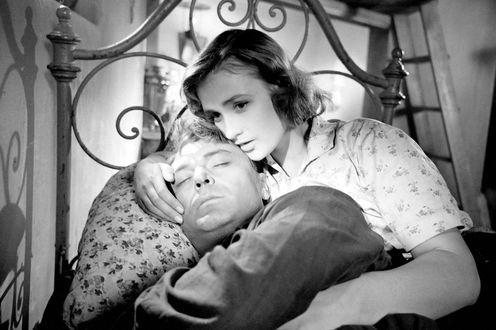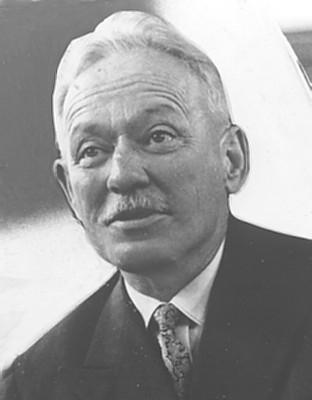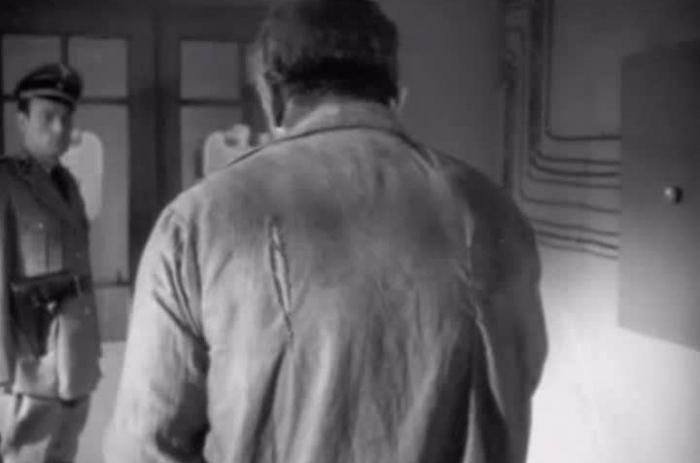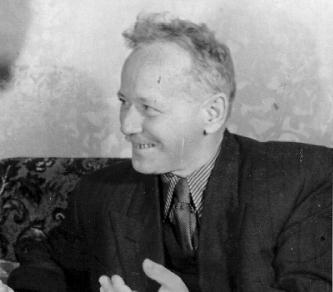In the fifties, the war was often remembered. Veterans were young, they eagerly enjoyed a peaceful life, enjoyed their work, many of them willingly studied at technical schools and institutes. However, each survivor of the war carried an unhealing wound in his soul, keeping the memory of the deceased relatives and friends. Most of the literary works of that time devoted to the front topic sang the great feat of the Soviet people, but the authors often lacked life experience, talent, and, obviously, there was such a sin as conjuncture. One of the first to create something worthwhile from military life was Mikhail Sholokhov (“The Fate of Man”). The content of this story, written in 1956, is simple and at the same time very complex, like life itself.
Narrative form
The technique used by the writer was often used in literature. “A story in a story” is a great way to convey the originality of the protagonist’s speech and to some extent relieve himself of responsibility for the person on whose behalf the story is being narrated. Say, this is not what I think, this is my hero, and people are different. However, Mikhail Sholokhov took advantage of this artistic device for a completely different purpose when he created the story “The Fate of Man”. Analysis of the work suggests the identity of the worldview of the author and his main character. The point is not the writer’s desire to distance himself from Andrei Sokolov, but the fact that his personal life experience did not give him the right to set forth events in which he himself did not participate. Sholokhov did not work as a driver, he did not fight and was not a prisoner either. He carefully listened to people who experienced unimaginable suffering, and empathized with them, and then tried to pass on the knowledge gained to the reader, both modern and future.

Pre-cloudless life
Chronologically, the work “The Fate of Man” is divided into two unequal parts. The first of them describes a cloudless and serene pre-war happiness. The modern reader may grimace skeptically. He knows how ordinary people lived in their thirties. He told a joke - to prison. He stole five ears of corn - to the camp. He simply expressed himself awkwardly and also fell into distant lands, to cut down the forest. And then poverty is well known. But Mikhail Sholokhov does not so embellish reality, although, of course, in a sense, he does not state the whole truth. Still, he is a Soviet writer, and works in the genre of socialist realism. It cannot be considered that the fate of man described by him is easy. An analysis of the pre-war period of the story gives reason to judge what disasters brought about by the collectivization of the Russian countryside. The hero’s father, mother and sister died of starvation in the Voronezh province, where Andrei Sokolov was born. He himself escaped this fate only because on a generous and fertile Kuban he bent his back on his fists (between the lines it is read that they were ordinary peasants, economic and not greedy). Again, the famine seemed to end, and in the native village the main character did not want to stay, he left for the city of Voronezh, worked in an artel, and then locksmith at the factory. The story set forth by Sholokhov is silent about how he managed to "liberate himself" (they simply did not let go of the collective farms). Well, somehow I could.

Personal happiness
The modern emancipated woman can simply be outraged by the epithets with which the protagonist of the story "The fate of man" describes his wife. The analysis of the work unambiguously creates the image of a slaughtered, tolerant slave, which only the followers of Domostroi could dream of. The husband will come home from work “angry as hell”, he will break the annoyance on his wife, and she will only know in response, smiling. I gave birth to three children. She was brought up in an orphanage, apparently, herself a village, parents, obviously, also starved to death. So the girl was knocked down by life. “And today he would dare to scoff at his wife in such a way, ripping off his anger? And he doesn’t want a frying pan on the head? ” - advocates of female equality would be indignant.
And in a sense, they would be right. But Sokolov’s wife was wiser. She defeated her husband’s rudeness in a Christian way, with love, and not reciprocal violence. True, I realized this and appreciated too late the Sholokhov hero. “The fate of man” is a story that has a deep Orthodox super-idea, although the author was not a religious person. Such is the paradox of Soviet art.
Bitter road
Now it is time to consider the “military” part of the narrative and its content. “The Fate of Man” is a story about the tragic summer months of 1942, when the Germans advanced and captured our soldiers not even in thousands - in millions. Sokolov did not escape this fate, although he, shell-shocked, could easily have been shot by the Nazis, who were stunned by the offensive. Then there was a road full of humiliation and torment, and not everyone stood it. The believing warrior, who did not want to defile the temple, paid with his life for his convictions. Someone was dying for another reason. Kryzhnev was destroyed by Sokolov for his intention to betray the commissar.
Camp and Muller
The scenes of life in a concentration camp occupy an important place in the plot of the story "The fate of man." The main characters (and the head of the place in which people were massively destroyed, can also be attributed to them, a very vivid image turned out) communicate at the laid table. Sokolova SS officer Muller wants to shoot, the prisoner was informed. Before death, the doomed is allowed to drink, the German is in a good mood today. In front of the amazed Germans, the Russian drinks three glasses of vodka "for his doom." He refused to drink for the victory of the Nazis. Muchler is so dumbfounded that he gives life to the captive, and even a loaf of bread with a piece of lard to boot. Sokolov shares food with his comrades.

Well, this scene, by its unreality, gives credibility to the story. Sokolov disposed of his gifted life as he considered it right. He is attracted to the duties of a chauffeur, he carries a German officer, and at the first opportunity he takes the car along with the chief to the front line, to ours.
After captivity
Yes, after all, there are inconsistencies in the plot of the story "The Fate of Man." The analysis of the work in combination with historical facts leads to the idea of the implausibility of further events. The Soviet prisoner is in the arrangement of units of the Red Army. He drove a German car, which means he "aided the invaders." If he had not been shot immediately, without understanding, the decision of the tribunal would be very strict. We did not have prisoners, but there were traitors. At best, one could dream of a penal battalion.
None of this has happened. The soldiers were "treated, fed", and sent home. There he learned about the death of his wife and daughters. If they were alive, obviously, would have stayed with them. And so - again to the front, as a volunteer. How did this happen in conditions of complete mobilization? Well, that’s not so important.
Son Anatoly
The method by which Mikhail Sholokhov introduces the reader to the characters in the story “The Fate of Man” is very interesting. The main characters do not always appear in the foreground, they are sometimes present invisibly. In a sense, this applies to Sokolov’s wife, but to a greater extent to his son. Fighting, his father finds out that his Anatoly is a tank hero, and even experiences some awkwardness mixed with pride. Here, they say, the father is an ordinary soldier, a studebaker chauffeur, and his son is an honored officer. He dreams of meeting, but not fate. Anatoly is hit by an enemy bullet on the last day of the war. Under such circumstances, it is unlikely that anyone will dare to condemn a person for losing interest in life.
After the war
Hard and tragic this part of the story "The fate of man." Her analysis is simple, the man’s reaction to the loss of all loved ones leads to a simple scheme: the protagonist drowns grief in wine. But at some point, when he met an orphan boy (there were many of them), he suddenly lit up with a happy thought that it might still be useful, that life would make sense if he devote it to caring for someone's soul. Sokolov tells the orphaned boy that he is his father. The boy believes that he has long been waiting for his dad from the front, but he still did not come. So two lonely hearts met. So the life of Andrei Sokolov again became meaningful.
Such, in general, is the story’s content. “The fate of man,” - this name, despite its apparent simplicity, succinctly reflects the tragedy of two military generations, orphaned children and lost sons and daughters of their parents.
Art side
It is time to distract from the storyline and proceed to assess the artistic merits of the work. In the end, the time was such that no one could write the whole truth, not even Sholokhov. Moreover, his views were very difficult. What is only one of his speeches at the process of Tertz and Sinyavsky! But still, Sholokhov is a genius.

This is a great story - "The fate of man." Analysis of the work from a literary point of view reveals the genius of the author. He easily and naturally gives characteristics to characters, without bothering the reader with detailed descriptions of appearance. The heroes' speech is peculiar and lively, they talk so that their voice sounds as if from the pages. You need to read Sholokhov, having tuned in to a meeting with art. Even the expression that has become a literary stamp about a “mean male tear” that rolled down Andrei Sokolov’s cheek can cause an ironic grin only for a person who is callous and does not know what life and fate are like. But tears are indeed masculine. And mean.